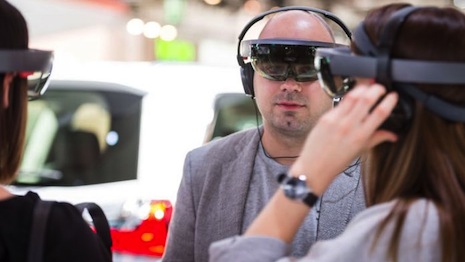 Artificial intelligence will open new doors and opportunities for luxury. Image courtesy of Amazon
Artificial intelligence will open new doors and opportunities for luxury. Image courtesy of Amazon
While consumers are now demanding transparency when it comes to artificial intelligence and data, they are willing to exchange their information for beneficial reasons.
With so much scandal surrounding data today online and through social media, research from RichRevelance is showing that all that is needed is honesty and a mutually beneficial experience. Most consumers within the United States, 59 percent, will readily give their personal information in exchange for quality customer service.
“Despite all the recent news around companies misusing customer data, we were surprised to see that the majority of Americans are willing to share data in exchange for a great customer experience,” said Raj Badarinath, vice president of marketing and ecosystems with RichRelevance, San Francisco, CA. “Consumers clearly understand there is value in helping retailers understand shopping behavior, and they are willing to help that process along if there is a clear benefit for them.
“This is particularly relevant for luxury, where the expectation for an outstanding customer experience is so high,” he said.
For the report, RichRevelance surveyed 1,037 consumers in the U.S. in May.
Creepy versus cool
The fourth annual Creepy or Cool consumer survey by RichRevelance shows that 81 percent of consumers expect companies to be transparent with their AI procedures.
 Lexus' on demand press conference through augmented reality. Image credit: Lexus
Users’ level of comfort when it comes to AI depends dramatically on what the technology is, whether it is facial recognition, AR, data, fingerprint scanning or wearable sensors.
For instance, brands who ask to follow wearable devices or sensors for tracking information to trade for a discount are deemed creepy, with 76 percent of consumers feeling this way.
Sixty-nine percent of survey takers believe that using AI to preorder products based on customer shopping habits is creepy. Those that believe facial recognition technology when a consumer walks into a store to deliver individual preferences is creepy make up 61 percent of the survey.
When it comes to what shoppers believe is cool, the divide is not quite so dramatic. For instance, the majority feels as though robots that guide customers to products within store aisles are cool, but only at 48 percent.
Forty-six percent of the survey takers believe that using fingerprint scanning for payment in stores, prompting at-home delivery is cool.
Lexus' on demand press conference through augmented reality. Image credit: Lexus
Users’ level of comfort when it comes to AI depends dramatically on what the technology is, whether it is facial recognition, AR, data, fingerprint scanning or wearable sensors.
For instance, brands who ask to follow wearable devices or sensors for tracking information to trade for a discount are deemed creepy, with 76 percent of consumers feeling this way.
Sixty-nine percent of survey takers believe that using AI to preorder products based on customer shopping habits is creepy. Those that believe facial recognition technology when a consumer walks into a store to deliver individual preferences is creepy make up 61 percent of the survey.
When it comes to what shoppers believe is cool, the divide is not quite so dramatic. For instance, the majority feels as though robots that guide customers to products within store aisles are cool, but only at 48 percent.
Forty-six percent of the survey takers believe that using fingerprint scanning for payment in stores, prompting at-home delivery is cool.
 In-store technology is a key concern of sales associates. Image credit: Hugo Boss
It is no surprise that younger consumers are more accepting of technology and AI, believing that many are more helpful than intrusive.
For instance, only 27 percent of millennials believe that chatbots and AI that help with customer service rather than a real person are creepy, compared to 41 percent of overall shoppers.
Additional insight
A panel of executives in luxury fields revealed how to carefully balance the line between helpful and creepy when it comes to personalization in marketing through the use of data.
During the panel, “Turning Numbers Into Identities For True Brand Relationships” at Luxury Interactive 2017, executives from Collective Retreats and Frette explained how data is important to connect with consumers, but it is a humanized touch that makes the impact. While too much personalization can turn off the consumer with an intrusive and creepy feel, the right balance can really make a difference (see story).
The conversation surrounding data and AI is more important now than ever thanks to major events in the news.
Repercussions surrounding Facebook’s invasive use of data have extended far beyond those directly involved, causing luxury marketers to now be more concerned about their use of customer information.
According to a survey from Kelton Research and SheerID, two to one consumers want brands to request consent before using their personal data. Only 8 percent are comfortable with marketers looking into social channels for individualized information such as likes and activity for promotional purposes, including discounts (see story).
“The number one takeaway from our survey is that consumers are demanding transparency when it comes to AI,” Mr. Badarinath said. “An overwhelming majority of Americans, eight in 10, believe that brands should tell them exactly how and when they are using AI.
“This is a very clear call to action for brands, who need to prioritize AI systems that are open and explainable so they can pass that information along to their shoppers,” she said.
In-store technology is a key concern of sales associates. Image credit: Hugo Boss
It is no surprise that younger consumers are more accepting of technology and AI, believing that many are more helpful than intrusive.
For instance, only 27 percent of millennials believe that chatbots and AI that help with customer service rather than a real person are creepy, compared to 41 percent of overall shoppers.
Additional insight
A panel of executives in luxury fields revealed how to carefully balance the line between helpful and creepy when it comes to personalization in marketing through the use of data.
During the panel, “Turning Numbers Into Identities For True Brand Relationships” at Luxury Interactive 2017, executives from Collective Retreats and Frette explained how data is important to connect with consumers, but it is a humanized touch that makes the impact. While too much personalization can turn off the consumer with an intrusive and creepy feel, the right balance can really make a difference (see story).
The conversation surrounding data and AI is more important now than ever thanks to major events in the news.
Repercussions surrounding Facebook’s invasive use of data have extended far beyond those directly involved, causing luxury marketers to now be more concerned about their use of customer information.
According to a survey from Kelton Research and SheerID, two to one consumers want brands to request consent before using their personal data. Only 8 percent are comfortable with marketers looking into social channels for individualized information such as likes and activity for promotional purposes, including discounts (see story).
“The number one takeaway from our survey is that consumers are demanding transparency when it comes to AI,” Mr. Badarinath said. “An overwhelming majority of Americans, eight in 10, believe that brands should tell them exactly how and when they are using AI.
“This is a very clear call to action for brands, who need to prioritize AI systems that are open and explainable so they can pass that information along to their shoppers,” she said.
